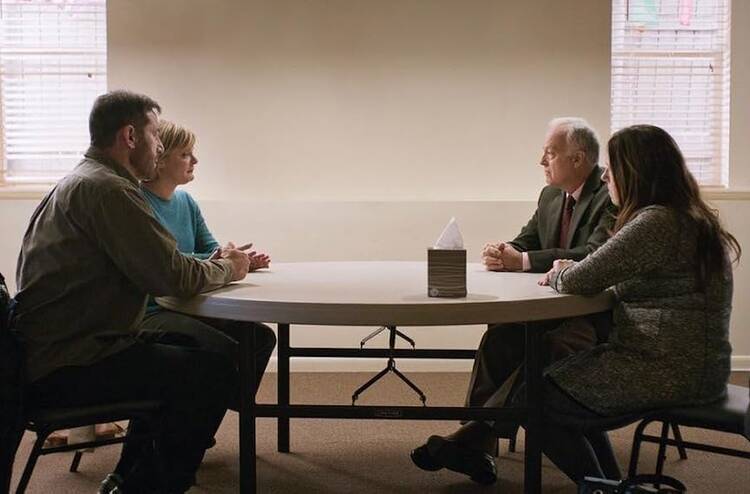Last week’s school shooting in Georgia is already receding from the news. The investigation and trial will play out below the fold for a while; maybe it will return to the spotlight in time for the verdict and sentencing. But it has been over a week, and that is about as long of a life cycle as a story like this can expect with the brutal churn of the election year news cycle and the relentless march of new tragedies. These stories are, sadly, too common now to hold our attention for long.
“Mass” (2021), written and directed by Fran Kranz, is concerned with the questions we ask in the wake of a school shooting. For the characters, those questions are deeply personal. In “Mass” the shooter is Hayden, the son of Linda (Ann Dowd) and Richard (Reed Birney); Evan, the son of Gail (Martha Plimpton) and Jay (Jason Isaacs), was one of the victims. Years later, the four parents meet in the basement of an Episcopal church to talk and try to heal. Gail and Jay say that their therapist encouraged them to be curious instead of interrogating. But as the conversation goes on, they are drawn again and again to the agonizing mystery at the heart of Hayden’s act: Why did this happen? And how can we prevent it from happening again?
By focusing on parental grief, “Mass” grounds us in human tragedy even as it touches on the political and social implications of Hayden’s act. In one heartbreaking exchange, the fathers admit that they recognized the tape outlines of their children’s bodies when police let them walk through the school. While it would be easy to reserve our empathy for Gail and Jay, the film challenges us to feel for both sets of parents. Linda and Richard are wracked with guilt as they reflect on how they might have failed their son. But we also see their love for him and their agony at not being able to grieve his loss publicly because of what he did before he died.
The film invites us to sit with the questions and eludes easy answers. The parents discuss possibilities: Was the catalyst the fact that Hayden was changing schools, was part of an online gaming community or was going to the gun range with friends? Did Hayden’s parents see the signs and fail to act? Or was Hayden broken from the start, destined for a violent end? Some of these elements are suggestive (it is notable that even when the characters disagree, no one denies that access to guns is a problem), but they never form a cohesive picture, a definitive solution.
The unspoken question, evoked by the film’s religious setting, is: Where is God in all of this? It is the most existential of all, but also—paradoxically—the one that the film comes closest to answering. The name of the church is Emmanuel Episcopal, and at one point a character stands framed beside a banner with the literal translation: “GOD WITH US.”
Where is God in the midst of horror and tragedy? God is with us. God is in the room with these four people as they try to understand and to heal. God is there when one character makes the difficult choice to offer forgiveness, and God is there when another—carrying a heavy burden of rage and grief—is struck by the delicate beauty of a choir’s song.
Between the time I began writing this column and finishing it, there was already another school shooting, in Omaha. A 15-year-old boy was seriously hurt and a 14-year-old boy is now in custody. No one was killed this time, a grim silver lining.
“Mass” doesn’t offer us solutions; like the characters, we need to find those solutions on our own and work to make them real. But the film reminds us that we are not alone, even in the face of great loss and endless questions. And when we come together to heal, make peace and imagine a better world for our children, God is with us.
“Mass” is streaming on Hulu.








